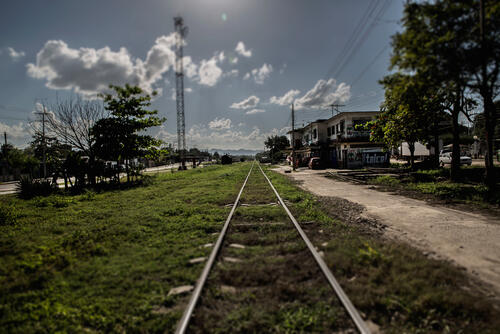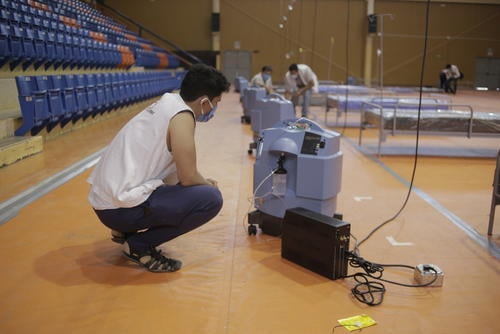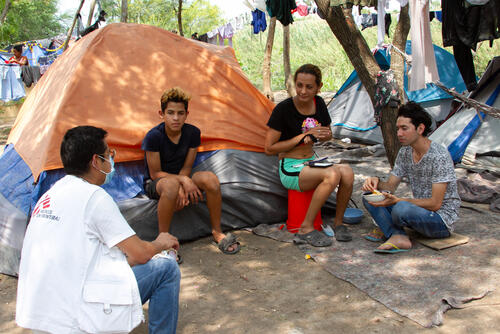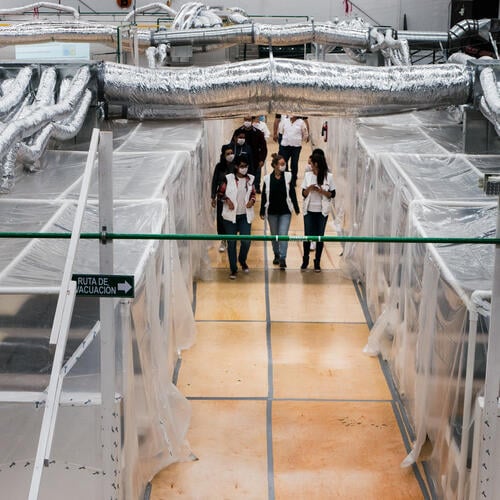- A Guatelaman asylum seeker died during a riot and fire in a detention centre in Tenosique, Mexico on 31 March.
- Médecins Sans Frontières (MSF) provided medical care and psychosocial assistance to 44 migrants and asylum seekers.
- We call for migrants in detention centres to be released and given protection and medical care.
Mexico City - Forty-four migrants and asylum seekers have received medical and psychological assistance from MSF following a riot and a fire in a detention centre in the Mexican town of Tenosique on 31 March in which a Guatemalan asylum seeker died. The MSF team also provided psychosocial care to the relatives of the dead asylum seeker.
According to the patients we saw, some detainees rioted and set alight the detention centre on the night of 31 March in protest at the poor conditions in which they were being held. They describe overcrowding, an absence of medical care, and a complete lack of information and preventive measures in the face of the COVID-19 health emergency.
“Testimonies from our patients and from the managers of the shelters where the detainees were relocated indicate that, on the day of the fire, the detention centre was over its capacity,” says Karolix Zambrano, MSF’s mental health coordinator in Tenosique. “There were 170 migrants and asylum seekers in a space for just 100 people.”
The overcrowding reported by detainees is particularly alarming in the context of the current COVID-19 pandemic.
We’ve seen patients with respiratory infections and fever who have received no medical attention in the past two weeks and were not isolated from other detainees.Esmeralda Orozco, MSF nurse in Tenosique
“We’ve seen patients with respiratory infections and fever who have received no kind of medical attention in the past two weeks and who were not isolated from the other detainees,” says Esmeralda Orozco, an MSF nurse in Tenosique. “We’ve also seen highly vulnerable groups of people, such as HIV patients, who had no treatment. Others reported a lack of water and poor hygiene conditions.”
Visits conducted by our teams to various migrant detention centres in southern Mexico in 2019 found that detainees received no regular medical attention and lacked essential services such as access to water, making them ideal breeding grounds for diseases such as COVID-19.
MSF calls on the Mexican authorities to release all those currently held in detention centres and to ensure that they receive tests and medical care to prevent possible infections.
We call on the Mexican government to ensure that migrants and asylum seekers can remain in Mexico in dignified and safe conditions, and to facilitate voluntary repatriations alongside the consulates of El Salvador, Guatemala and Honduras.Sergio Martín, head of MSF operations in Mexico.
"Taking into account the degree of expansion of the COVID-19 epidemic in Mexico, keeping migrants in detention seriously jeopardises their health," says Sergio Martín, head of MSF operations in Mexico.
Meanwhile, those detainees who wish to be voluntarily repatriated have been unable to return to their own countries after Guatemala closed its borders and asked Mexico to cancel the repatriation of people from Guatemala, El Salvador, Honduras and Nicaragua, who need to pass through Guatemala to reach their countries of origin.
“We call on the Mexican government to ensure that migrants and asylum seekers can remain in Mexico in dignified and safe conditions, and to facilitate voluntary repatriations alongside the consulates of El Salvador, Guatemala and Honduras,” says Martín. “It is urgent that authorities across the region implement measures to limit the risk of contagion among this population group and to ensure access to healthcare, both in Mexico and in their countries of origin for those who choose to return.”






